VOOD FEED
A beginner’s guide to vegan living

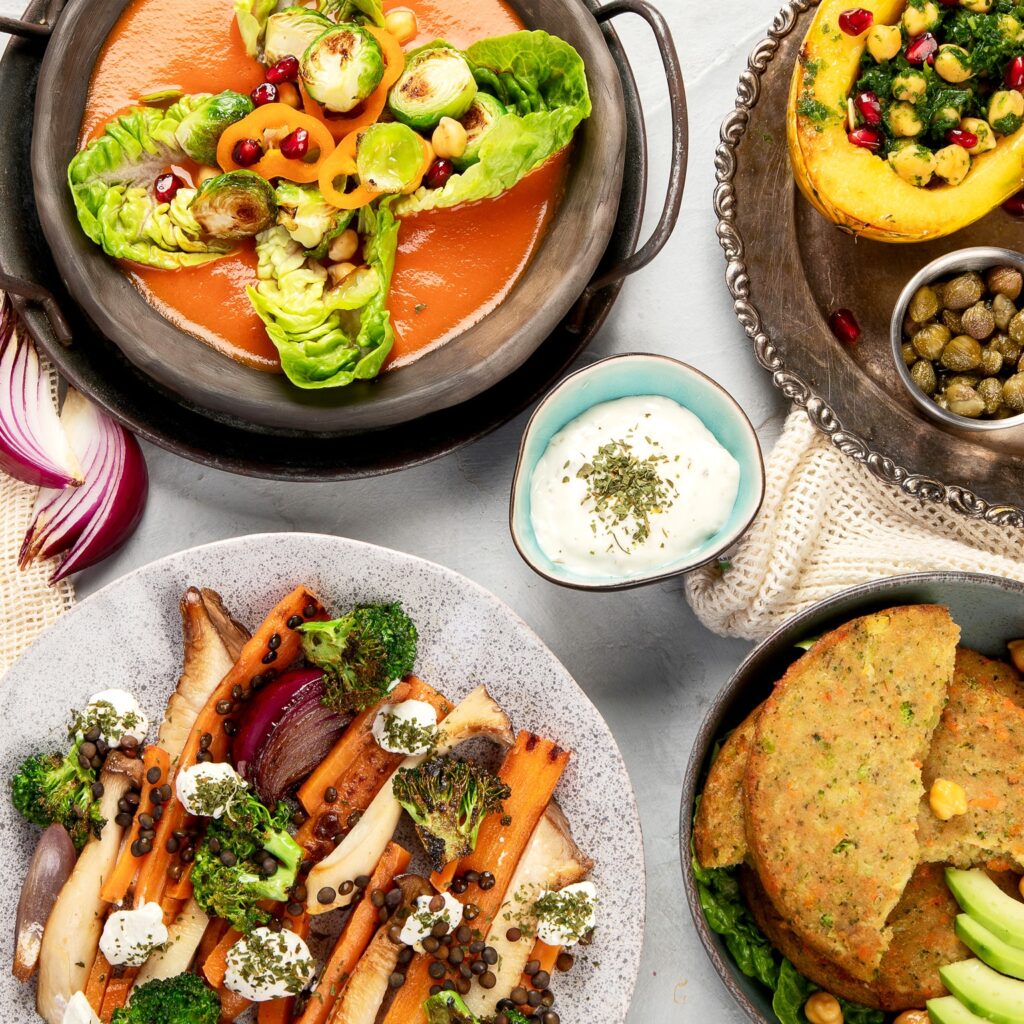
Tips and hacks to help you ease yourself into vegan living
There are many ways to get started on your way to leading a vegan lifestyle: from eating strict vegan menus from day one, to being flexible (flexitarian) and combining vegan dishes with occasional consumption of animal products.
The decision to lead a completely vegan lifestyle is often motivated by many good reasons: Less animal suffering, fewer CO2 emissions, less damage to the environment – and instead, more healthy plant-based alternatives on your plate. More and more people are deciding to help animals, the environment and the climate by eating a purely plant-based diet and leading a vegan lifestyle. However, if you’re still at the very start of your vegan journey, you might find yourself confronted with banal questions that you would never have had to think about before, during your time as a non-vegan.
To help you avoid some of the pitfalls, we’ve put together a few beginner’s hacks to help ease you into vegan living. After all: everyone has to start somewhere! And, especially for newbie vegans, it can be helpful to hear the best tips and hacks so that you can find the right food – which is also delicious – for your new menus.
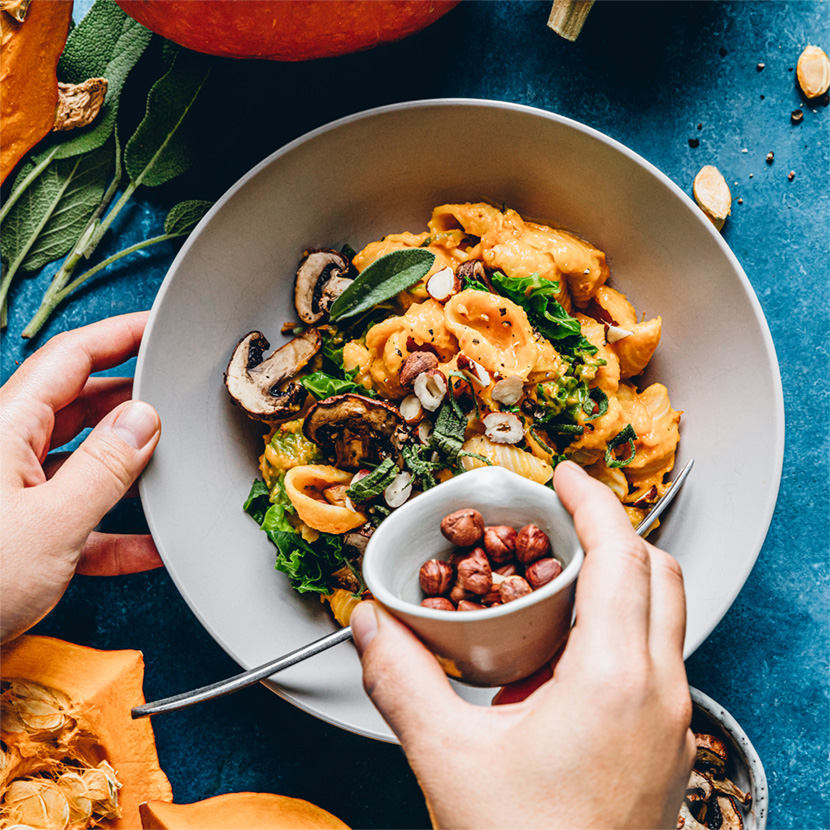


More is more
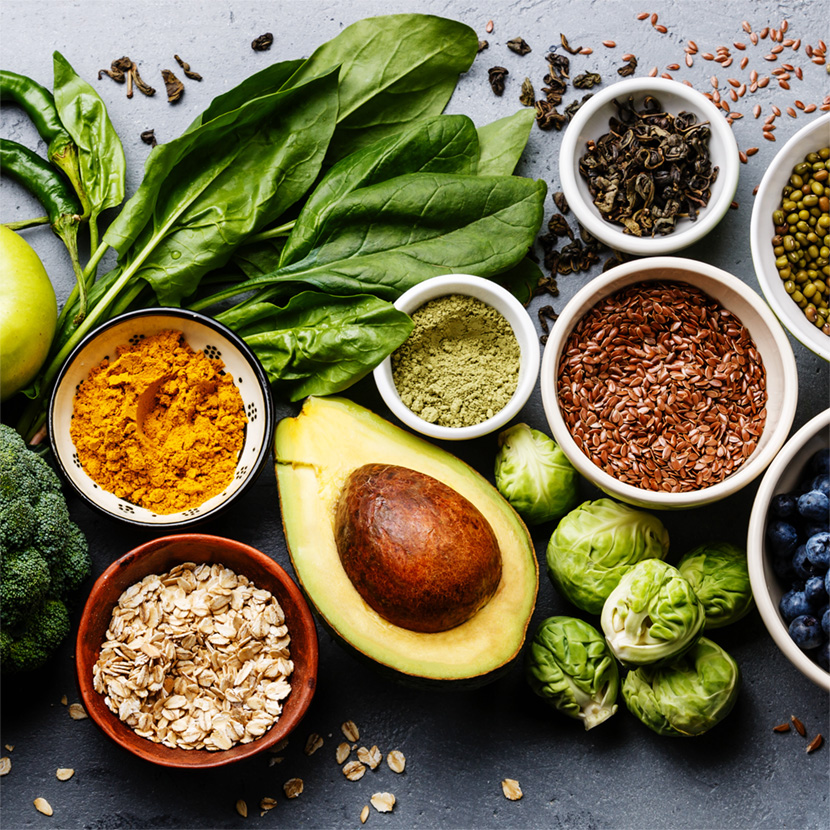
If you’re following a vegan diet, you definitely need to make sure you’re eating plenty, as many plant-based ingredients give you lots of volume and contain plenty of water, but very few calories. To feed your body enough energy, you need to check you’re getting enough calories. Foods that provide relatively large amounts of fats and calories include nuts, seeds, and plant-based oils.
Having a well-stocked store cupboard and refrigerator will help you in your everyday vegan life, making sure you always have enough choice available to be able to make delicious vegan meals. It will also help you to make sure you always meet your calorie needs while avoiding sudden urges to overindulge.
Low carb is so last year
If you’ve ever tried to lose weight or go on a diet, you’ll be familiar with a fear of carbohydrates. After all, many people see them as public enemy number one when it comes to getting a smaller waistline. So, it became common for people to think they had to keep away from energy-rich carbohydrates, which were portrayed as fattening – especially after 6pm, or in combination with fat and sugar.
Vegan living means enjoying good carbohydrates in moderation, because they provide around 70 percent of the energy you will need for a vegan diet. Cutting them out of your diet would make a vegan lifestyle almost impossible.
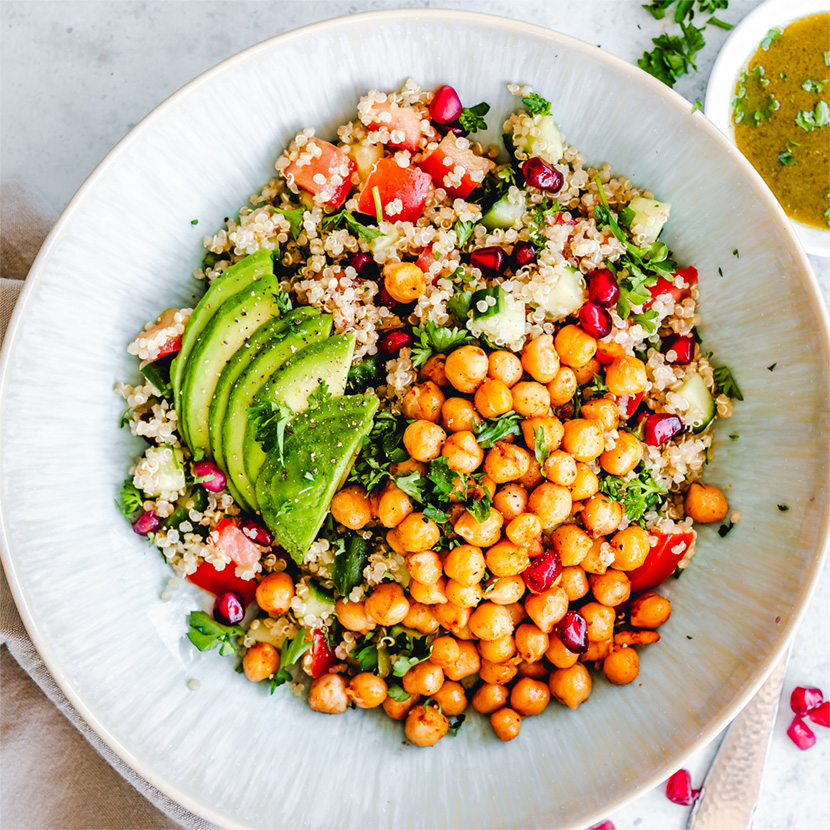
Let’s show plant-based proteins a bit of appreciation

It’s a widespread cliche that vegans don’t get enough protein from their diets. The fact is, however, that if you eat a balanced vegan diet with enough calories, you will get enough of all the important amino acids. The main plant-based protein sources are pulses and whole grains. Additional sources include nuts and seeds as well as soy products and tempeh.
You’ll find more interesting information about proteins here.
Say yes to a naturally diverse range of nutrients
Something that’s not just important for people following a vegan lifestyle is avoiding industrially produced “empty” calories in favor of plenty of fresh, natural produce. If you make sure you eat plenty of good-quality vegetables, fruit and whole grains, you’ll give your body all the natural nutrients and vital substances it needs on a daily basis. Herbs, wild herbs and sprouts are also worth reading up on and giving a try! Nature really is a great source of inspiration for vegan cooking!
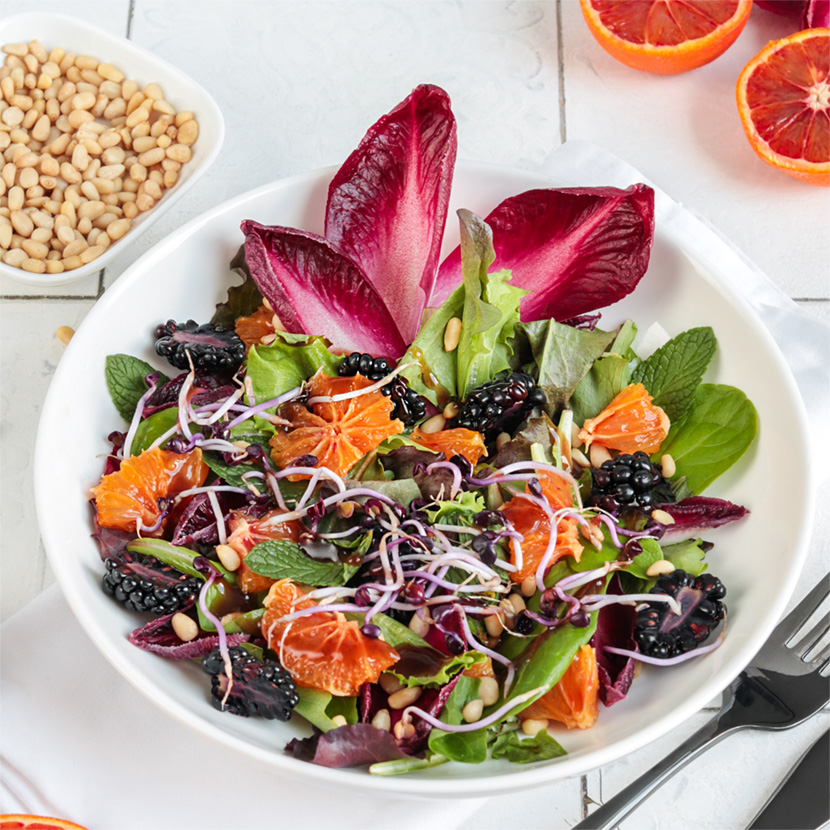
It’s all in the way you combine foods

If you change your diet, you should expect that your stomach and gut will take a few days to get used to the new foods. Only once the micro-organisms in your digestive tract have gotten used to their new nourishment will your digestion get back to normal. It’s also helpful to eat regular meals and not to mix certain foods – or to eat them one right after another. The best thing to do is to listen to your gut – quite literally!
Taking the right supplements
“People who eat a vegan diet bring about a permanent state of malnutrition and unbalanced nutrition.” Few prejudices about plant-based diets are as persistent as this one. In fact, as is the case with any diet, anyone who decides to follow a plant-based diet must make sure that what they eat each day is balanced. One exception vegans need to be aware of is vitamin B12 (cyanocobalamin), which is only found naturally in animal products such as milk, meat and eggs. For those on a plant-based diet, you should make sure you’re getting enough vitamin B12 by taking dietary supplements or eating specially fortified foods. You can also find some particularly energy-rich additions to your daily menu here at Velivery.

You are not alone

More and more people are deciding to give up animal products. Twenty years ago, people who lived a strict vegan lifestyle were still regarded mistrustfully and treated as outsiders. After all, the “tough”, “cool” guys were often assumed to be those with the biggest steak on the barbecue, while the vegans preferred to nibble quietly on their vegetable sticks with their heads in the clouds. That’s how stupid prejudices can be.
But veganism is not just fashionable – it’s also forward-looking. And this can be backed up with facts and figures that look at how things are going to develop in the future. Issues like sustainability, ethics, and the protection of nature and the environment have long since no longer been seen as stuffy outsider subjects: instead, they are on everyone’s screens. Thanks to modern vegan cuisines and alternatives, plant-based food has rightly made its way into the foreground, as it not only protects the environment – it is also sustainable. Referring to the vegan lifestyle as a mere trend therefore no longer does it justice (and has not done so for a long time), as it has many famous, semi-famous and extremely cool proponents.
Together, starting out will be as easy as (vegan) pie! You’ll find communities, locations and like-minded people all over the place. And that includes us here at Velivery. Why not follow us on Facebook and Instagram, subscribe to our newsletter, and get inspiration from stories and even more recipes from our website?!
VEGAN HACKS – our first four tips for adding a touch of refinement to your vegan cooking
1. Tastes like scrambled eggs thanks to Kala Namak
This “black salt”, which contains sulphur compounds, is especially widespread and popular in its country of origin, India, as well as in southeast Asia. Due to the sulphur compounds it contains, however, Kala Namak isn’t just any old salt: it gives dishes the characteristic flavor of eggs. This means you can use it in combination with tofu to whip up delicious vegan scrambled eggs for breakfast in no time at all!
2. Nutritional yeast flakes – a vegan all-rounder
Nutritional yeast flakes are to vegan cuisine what Parmesan is to many Italian dishes. Mixed with crushed cashews, they make the perfect replacement for Parmesan – which is very similar to the original in terms of both consistency and flavor. You can also use nutritional yeast flakes to give pasta or risotto the right seasoning.
3. Aquafaba
Beaten egg whites are a very popular and versatile kitchen ingredient. So it’s wonderful that they have a revolutionary, vegan twin in the form of aquafaba! This vegan miracle ingredient is obtained from water in which various pulses have been soaking. Simply whisk the drained liquid with a little icing sugar until you get stiff peaks and the mixture is so solid that you can hold the bowl upside down over your head.
4. Tofu – double the flavor
Tofu is a real all-rounder when it comes to vegan cuisine. It’s a source of protein, a meat replacement, a spread… it’s harder to find dishes where you can’t use tofu. When cooking it on the barbecue or as a meat substitute, you can use a simple trick to make it even more flavorful: When tofu is frozen, its pores get bigger and the water it contains seeps out. This means it is better able to absorb salts, spices or marinades. Not only can this intensify the flavors of tofu dishes: it can also add to and enrich the diversity of flavors possible.
5. FLAVOR POWERHOUSES – miso, sriracha and vegan fish sauce
Good vegan cuisine is all about achieving the right flavor. With the right herbs and spices, you can conjure up a very wide range of flavor variations. If you’re looking for a real all-rounder in terms of flavor, we recommend miso. This traditional Japanese fermented seasoning paste is a real miracle-worker in terms of flavor, and provides the ideal basis for soups, sauces, vegetable stir fries and much, much more. For Thai, Vietnamese and other Asian dishes, we’d also recommend vegan fish sauce. Made from seaweed and shiitake mushrooms, it adds an exciting Asian touch to any dish. And finally, it’s definitely worth getting to know sriracha: this spicy chili sauce, which is named after the coastal Thai city of Si Racha (and is available in a range of spice levels), can be used for rounding off Asian dishes – and so much more!
Have fun experimenting with our hacks and tips! We hope you enjoy plenty of beginner’s luck!















